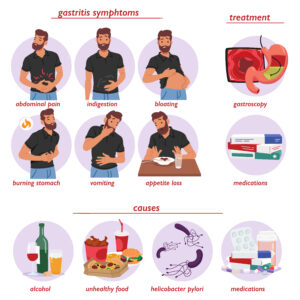
Common Gastrointestinal Disorders
Gastrointestinal (GI) disorders are health problems that affect the digestive system — including the stomach, intestines, esophagus, liver, pancreas, and gallbladder. These issues can range from common and mild, like indigestion or constipation, to more serious concerns such as Crohn’s disease, ulcerative colitis, or liver cirrhosis.
In today’s world, where stress, poor diet, and lack of exercise are becoming the norm, GI disorders are on the rise. The good news? With proper diagnosis, expert care, and simple lifestyle changes, most digestive issues can be effectively managed. This article takes you through the full journey — from diagnosis to recovery — so you can understand your symptoms better and know how to take control of your gut health.
Understanding Gastrointestinal Disorders
Common GI disorders include:
- Acid Reflux (GERD): When stomach acid flows back into the esophagus, causing heartburn and discomfort.
- Irritable Bowel Syndrome (IBS): A condition that leads to bloating, abdominal pain, diarrhea, or constipation.
- Constipation: Fewer than three bowel movements a week, often with hard or dry stools.
- Diarrhea: Frequent, loose, or watery stools that may be caused by infection, medication, or chronic conditions.
- Gallstones: Hard deposits in the gallbladder that can block bile flow and cause pain.
- Liver Diseases: Including fatty liver and hepatitis, which can damage the liver over time.
- Crohn’s Disease and Ulcerative Colitis: Inflammatory bowel diseases that cause chronic inflammation in the digestive tract.
Early Signs You Shouldn’t Ignore
Sometimes, GI disorders develop gradually. Here are some early symptoms to watch out for:
- Frequent abdominal pain or cramps
- Changes in bowel habits (constipation or diarrhea)
- Feeling bloated or gassy more than usual
- Persistent heartburn or acid reflux
- Blood in stool
- Unexplained weight loss
- Feeling full quickly when eating
If any of these symptoms last more than a few days or occur frequently, it’s time to seek medical advice.
Diagnosis: The First Step Toward Healing
When you visit a doctor for digestive issues, they will start with a detailed health history and a physical exam. Based on your symptoms, they may recommend further tests such as:
- Blood tests to check for infections or inflammation
- Stool tests to detect parasites or blood
- Endoscopy or Colonoscopy to look inside the digestive tract
- Ultrasound or CT scans to get images of your organs
- Liver function tests if liver problems are suspected
Getting an accurate diagnosis is key. It not only helps your doctor understand the cause of the problem but also ensures that you receive the right treatment plan.
Treatment Options for Common GI Disorders
1. Lifestyle and Diet Changes
For many digestive problems, especially GERD, IBS, and constipation, the first line of treatment is lifestyle change. These include:
- Eating a fiber-rich diet (fruits, vegetables, whole grains)
- Staying hydrated
- Eating smaller, more frequent meals
- Reducing spicy, oily, and processed foods
- Quitting smoking and limiting alcohol
- Managing stress with exercise or relaxation techniques
2. Medications
Depending on your diagnosis, your doctor may prescribe:
- Antacids or acid reducers for reflux
- Laxatives or stool softeners for constipation
- Antibiotics for infections
- Anti-inflammatory drugs for conditions like ulcerative colitis
- Probiotics to restore healthy gut bacteria
- Immunosuppressants for chronic inflammatory conditions
3. Surgical Options
In some cases, such as gallstones, polyps, or severe ulcerative colitis, surgery might be necessary. These procedures are often minimally invasive and aim to remove the problem area or repair damaged tissue.
Recovery and Long-Term Management
Recovery time depends on your condition and treatment plan. Here’s how you can support your healing:
- Follow Medical Advice: Take medications as prescribed and attend follow-up appointments.
- Stick to Your Diet: If your doctor recommends avoiding certain foods (like gluten, dairy, or spicy items), do so strictly.
- Stay Active: Regular movement improves digestion and reduces stress.
- Track Your Symptoms: Keeping a food and symptom diary can help spot triggers and improve treatment outcomes.
- Get Support: GI disorders can affect mental well-being. Support groups or talking to a counselor can help you cope emotionally.
Preventing Digestive Problems Before They Start
Preventing digestive disorders is possible with a few everyday habits:
- Eat on time and chew your food well
- Don’t lie down immediately after meals
- Drink plenty of water throughout the day
- Limit fast food, fried items, and sugary drinks
- Take time to relax and avoid stress overload
- Get routine checkups if you have a family history of GI issues
Choosing the Right GI Specialist
Having the right doctor makes a huge difference. If you live in Gujarat, consider consulting one of the top 10 gastroenterologist in Surat for trusted care and expert treatment. They can help diagnose complex issues, explain your options clearly, and work with you on a plan that suits your lifestyle and needs.
Final Words
Managing gastrointestinal disorders can feel overwhelming at first, but with proper diagnosis, timely treatment, and small daily changes, recovery is absolutely possible. Whether it’s heartburn, constipation, or something more serious, listening to your body and taking action early is the key.
Your digestive system plays a vital role in your overall health, and taking care of it means taking care of your entire body. So eat well, stay active, manage stress, and don’t hesitate to seek expert advice when needed — because your gut health matters!
